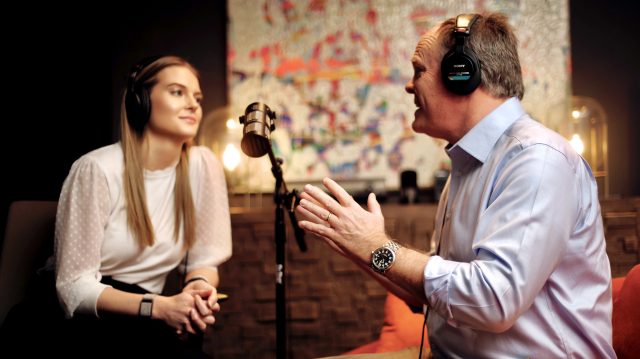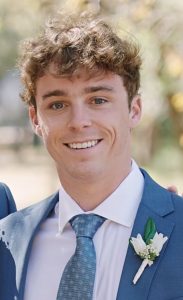
David Magee (right), director of operations at the William Magee Institute for Student Wellbeing, conducts an interview for ‘The Mayo Lab Podcast.’ The program launched Feb. 28 on major podcast platforms with a goal of providing information and resources for parents. Photo courtesy Red Window Communications
OXFORD, Miss. – The statistics about America’s youth mental health crisis – which tell of pervasive hopelessness and shocking rates of suicidal ideation – are grim.
The Thomas Hayes Mayo Lab, a University of Mississippi project dedicated to student well-being, is committed to changing that dynamic. The lab team is starting a different conversation around student mental health and substance misuse with a new podcast tackling the crisis.
“The Mayo Lab Podcast,” which launches Tuesday (Feb. 28) on all major podcast platforms, is hosted by bestselling author and national recovery advocate David Magee.
“People are ready for honest talk about what teens and families face today, and ‘The Mayo Lab Podcast’ is about transparency,” he said. “It’s about having lively, empathetic, honest conversations. We’re not going to hold back the tears – or the laughter.”
Magee also serves as director of operations at the William Magee Institute for Student Wellbeing, which houses The Mayo Lab. But for him, the podcast’s focus is a personal one. He lost his son William to an accidental drug overdose, which he wrote about in his 2021 memoir “Dear William.”
“This story is my own,” Magee said. “I’ve got my own journey in recovery where I nearly lost everything, and, in some ways, I did.
“My wife and I lost our oldest child, William, who was an Honors College student, a track athlete, fluent in Spanish and just one of the most precious young men I’ve known.”
Following William’s death, Magee felt called to help other young people struggling with mental health issues or addiction, as well as their families. The podcast grew directly out of conversations he’s had with students and their parents while speaking at schools around the country, he said.
“I’ve gotten to engage with so many parents, and what I’ve found is they need resources, they need help dealing with this teen mental health crisis,” he said. “We realized we need to create a resource for them to learn, bringing together top experts, researchers, educators, student voices and parent voices.”
The podcast’s first season will cover several of-the-moment topics, including the teen sleep deprivation epidemic, social media’s impact on mental well-being and the ever-increasing potency of marijuana. Magee navigates these complex topics with the help of advocates including Zac Clark, researchers such as Adam Downs and educators like Travita Godfrey, as well as affected students and parents themselves.
Each episode will provide advice and tips to equip parents to communicate with and help teens in their lives who may be struggling.
“I hope listeners will come away as better parents, more able to reach their teens effectively,” Magee said. “I hope they will see relationships grow and flourish and that they will see their teens thrive.
“That’s what we aim to do with ‘The Mayo Lab Podcast’ – to help our teens find the joy they want and deserve.”
The Mayo Lab was founded in 2022 in the wake of Ole Miss student Thomas Mayo’s death at age 21 from fentanyl poisoning. Magee knew Thomas personally, even helping him to get into treatment.
“As so often happens in recovery, it’s not just a straight line up, and sometimes there’s relapse,” Magee said. “Thomas relapsed and unfortunately, he lost his life.
“This podcast is about honoring Thomas, and it’s also about saving so many other lives.”
Operating within the Magee Institute’s Jackie and Faser Triplett Center for AOD Research, The Mayo Lab is working to change the larger, societal conversation around youth, teen and young adult mental health through a combination of research and storytelling. Besides the podcast, The Mayo Lab’s efforts include training students in peer-to-peer education and developing a mental well-being curriculum for K-12 students.
“How can we use peer-to-peer conversations to more effectively spark interventions around suicidal ideation, anxiety, depression and addiction?” said Meagen Rosenthal, interim executive director of the Magee Institute. “How can storytelling drive messages home? These are the big questions our lab is trying to answer.”
For more information about The Mayo Lab, go to https://themayolab.com.
